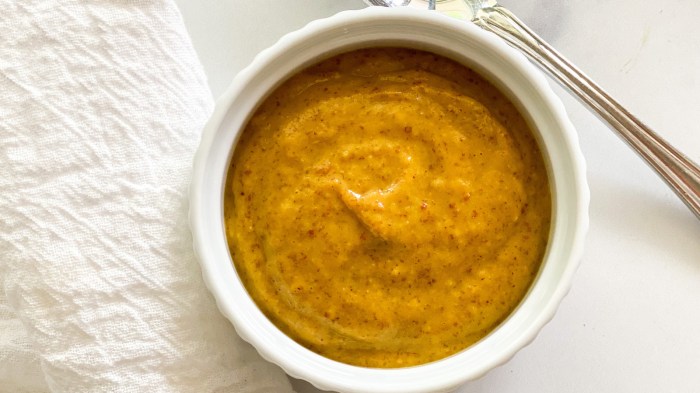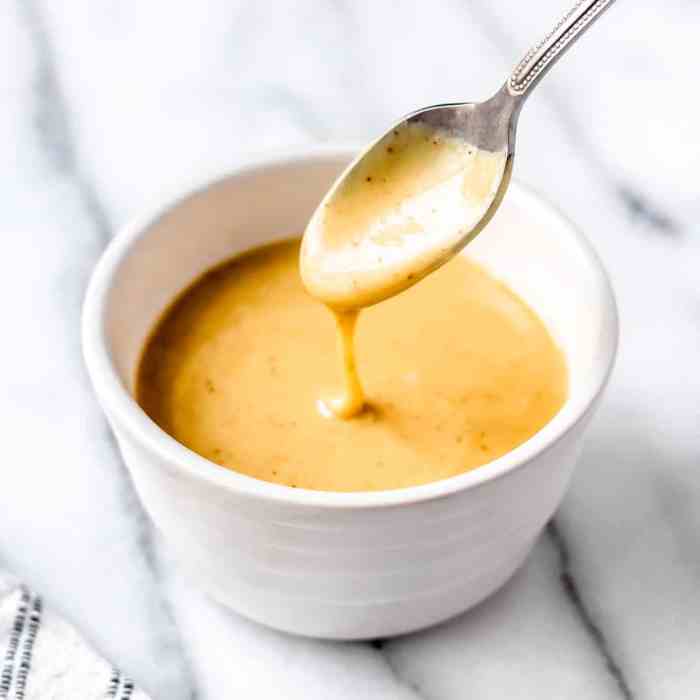Best Mustard Sauce Recipe A Culinary Guide
Mustard Sauce: A Culinary Exploration: Best Mustard Sauce Recipe

Source: mashed.com
Best mustard sauce recipe – Mustard sauce, a seemingly simple condiment, boasts remarkable versatility and a rich history. Its ability to transform dishes from mundane to magnificent stems from its adaptable flavor profile and diverse applications across various cuisines. From the sharp tang of a classic Dijon to the sweet heat of a honey mustard, this sauce offers a spectrum of taste experiences.
Introduction to Mustard Sauce

Source: deliciouslittlebites.com
Mustard sauce’s journey spans centuries, evolving from ancient preparations to the sophisticated variations we enjoy today. Its origins can be traced back to ancient civilizations, with evidence suggesting its use in both Greek and Roman times. Over time, different cultures have incorporated their unique ingredients and techniques, resulting in the diverse range of mustard sauces available today. The type of mustard used significantly impacts the final product’s flavor.
Common varieties include Dijon mustard (known for its tangy, slightly acidic flavor), yellow mustard (mild and slightly sweet), and whole grain mustard (robust and earthy). These variations, along with other ingredients, create a wide array of flavor profiles.
Essential Ingredients and Their Variations
The foundation of most mustard sauces consists of mustard, vinegar, and oil. These core ingredients provide the essential base flavor and texture. However, the possibilities extend far beyond these basics. Adding elements like honey introduces sweetness, while spices such as turmeric or paprika can add warmth and depth. Fresh or dried herbs, such as thyme or chives, offer aromatic complexity.
Crafting the best mustard sauce recipe often involves balancing sweet and tangy notes. A great way to enhance the flavor profile is by considering complementary sauces; for instance, the robust depth of a best barbecue sauce recipe for pulled pork can offer inspiration. The smoky sweetness found in many barbecue sauces can be subtly mirrored in a mustard sauce, creating a unique and delicious result.
Ultimately, the best mustard sauce recipe is one that satisfies your personal palate.
The type of vinegar employed significantly alters the final taste. White wine vinegar provides a bright acidity, while apple cider vinegar imparts a more mellow, fruity note.
| Mustard Type | Flavor Profile | Suitable Dishes | Notes |
|---|---|---|---|
| Dijon | Tangy, slightly acidic, complex | Grilled meats, salads, sandwiches | Pairs well with rich flavors |
| Yellow | Mild, slightly sweet | Hot dogs, hamburgers, deviled eggs | Versatile and widely accessible |
| Whole Grain | Robust, earthy, slightly spicy | Roasted vegetables, cheeses, charcuterie | Adds texture and complexity |
Recipe Variations and Techniques
The following recipes illustrate the versatility of mustard sauce. Proper emulsification—the process of combining oil and vinegar—is crucial for achieving a smooth, stable sauce. This involves slowly whisking the oil into the vinegar-based mixture, creating a stable emulsion that prevents separation.
Classic Dijon Mustard Sauce
- Whisk together 1/4 cup Dijon mustard, 2 tablespoons white wine vinegar, and 1 tablespoon olive oil.
- Slowly whisk in an additional 1/4 cup olive oil until emulsified.
- Season with salt and pepper to taste.
Spicy Brown Mustard Sauce
- Combine 1/4 cup brown mustard, 2 tablespoons apple cider vinegar, 1 tablespoon olive oil, and 1/2 teaspoon cayenne pepper.
- Slowly whisk in an additional 1/4 cup olive oil until emulsified.
- Season with salt and pepper to taste.
Sweet Honey Mustard Sauce
- Whisk together 1/4 cup Dijon mustard, 2 tablespoons honey, 1 tablespoon apple cider vinegar, and 1 tablespoon olive oil.
- Slowly whisk in an additional 1/4 cup olive oil until emulsified.
- Season with salt and pepper to taste.
Creamy Mustard Sauce
- Combine 1/2 cup mayonnaise or crème fraîche, 2 tablespoons Dijon mustard, 1 tablespoon lemon juice, and 1 tablespoon chopped fresh chives.
- Season with salt and pepper to taste.
Flavor Pairings and Culinary Applications
Mustard sauce enhances a wide range of dishes. Its sharp, tangy, or sweet notes complement various flavors, textures, and cuisines. It serves as an excellent marinade for meats, adding depth and complexity. As a dipping sauce, it elevates simple appetizers and sides.
| Mustard Sauce Variation | Suitable Dishes | Specific Notes | Example |
|---|---|---|---|
| Classic Dijon | Grilled chicken, roasted vegetables, sandwiches | Enhances savory flavors | Dijon mustard sauce on a grilled chicken sandwich |
| Spicy Brown | Sausages, burgers, spicy dishes | Adds a kick of heat | Spicy brown mustard sauce with bratwurst |
| Sweet Honey | Roasted pork, salads, chicken wings | Balances sweet and savory notes | Sweet honey mustard sauce as a glaze for chicken wings |
| Creamy Mustard | Seafood, sandwiches, dips | Adds richness and creaminess | Creamy mustard sauce as a dip for vegetables |
Visual Presentation and Serving Suggestions
A well-made mustard sauce should have a smooth, creamy consistency and a vibrant color reflective of its ingredients. Garnishing can elevate its visual appeal. A simple sprinkle of fresh herbs or a drizzle of high-quality olive oil can add sophistication. Serving suggestions range from a classic squeeze bottle to a small bowl alongside the main dish. A beautifully plated dish might feature a vibrant green salad, grilled salmon drizzled with a golden honey mustard sauce, and a sprinkle of fresh dill.
Storage and Shelf Life, Best mustard sauce recipe
Proper storage is essential for maintaining the freshness and quality of mustard sauce. Refrigerate the sauce in an airtight container. It will generally remain fresh for 1-2 weeks in the refrigerator. Freezing is not recommended as it can alter the texture and flavor. Signs of spoilage include mold growth, off-odors, or a significant change in texture.
Discard any sauce that exhibits these signs.
FAQ Resource
Can I make mustard sauce ahead of time?
Yes, mustard sauce stores well in the refrigerator for up to a week. Ensure it’s stored in an airtight container.
What happens if I use too much vinegar?
Too much vinegar will make the sauce overly tart. You can try to balance it by adding a touch of honey or sugar.
Can I freeze mustard sauce?
Yes, you can freeze mustard sauce for up to three months. Thaw it slowly in the refrigerator before using.
What type of oil is best for mustard sauce?
Mild-flavored oils like canola or grapeseed oil work well. Avoid strongly flavored oils that might overpower the mustard.





















